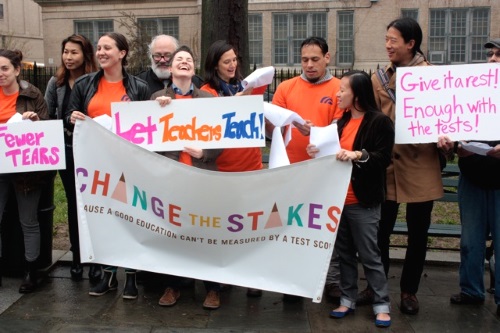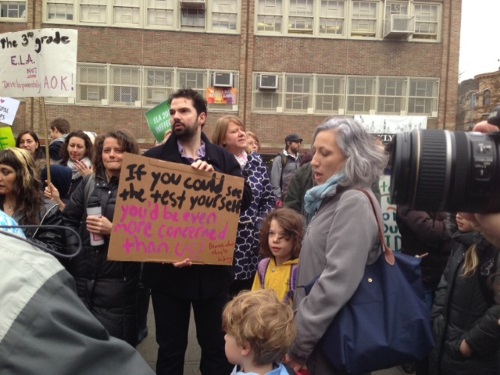Brooklyn Teachers for English Language Learners Protest Against Common Core
At the International High School in Brooklyn’s Prospect Heights (IHSPH), 95 percent of its students are classified as English Language Learners. On May 1, IHSPH teachers protested on the school’s steps to announce that 30 teachers and staff at IHSPH have refused to administer the Common Core's English Language Arts Performance Assessment exam to their students.

Teachers rallying on the steps of International High School in Prospect Heights against the ELA test on May 1st, 2014. Photo by Carl Makower.
On May 1, teachers at the International High School in Brooklyn’s Prospect Heights (IHSPH) gathered on the school’s steps to announce that 30 teachers and staff at IHSPH have refused to administer the English Language Arts (ELA) Performance Assessment exam to their students of whom about 95 percent are English Language Learners (ELLs). Thirty-five percent of the school’s students are classified as Students with Interrupted Formal Education (SIFE), meaning they have missed more than one year of school. More than 50 percent of the parents at IHSPH have also chosen to opt their children out of the test. In October, ninth and tenth grade students at IHSPH were given a pre-assessment. Most of these students have come directly from another country with very little English language background. Although state testing required only those who have received at least one year of English to take the exam, for many this exam was their first experience taking a standardized test in the United States.“Even with one year of English, they were still not at a tenth grade reading level. The students tried really hard, and they wanted to do well,” says Rosie Frascella, a 12th grade English teacher at IHSPH. “The exams created demoralization and anxiety for these students.”According to a May 1 press release from IHSPH, “The test was constructed and formatted without any thought for the 14 percent of New York City students for whom English is not their first language.” The press release goes on to state, “Furthermore, the test was a traumatic and demoralizing experience for students.” “We don’t want to put our students through this. It’s going to do more harm than good,” says Frascella. “We would rather teach than assess our students with an assessment that is not created by us and would not help our students.” The IHSPH teachers have signed a letter to the chancellor of New York City Schools, Carmen Farina, asking her to reconsider the use of the Common Core’s English language test with ELLs. They have also put together a website asking for support.

In 2010, Pearson was awarded a five-year contract for $32 million with the NYS Dept. of Education to develop English Language Arts and Math assessments.
Also at stake is big business. In 2010, Pearson received a five-year contract for $32 million with the New York State Department of Education to develop English Language Arts and math assessments for grades 3 – 8. In 2012, the company apologized for presenting such poor test questions such as the one about the “talking pineapple” that schools had to discount before re-scoring the exams. This is the second year that the assessments in New York are based on the Common Core Learning Standards, adopted by 44 out of 50 states and the District of Columbia. Since the implementation of the exam, educators and parents across New York have expressed objection to the ELA. Schools, teachers, and parents have been taking this issue seriously, because the results of this high stakes test has considerable influence on student promotions to desirable middle schools as well as the tests' weight in teacher evaluations, as SLJ covered regarding Kansas teacher's evaluations on April 7. Early April, Chancellor Fariña announced a change in regulation for New York City’s school system that will establish a new promotion policy in grades 3 – 8 to reduce the importance of standardized test scores in deciding if a student should repeat a grade. However, the test continues to face questioning over the validity of its material.
Teachers and parents rallying against the English Language Arts assessment test on April 4 at P.S. 321 in Park Slope. Photo courtesy of P.S. 321 parent.
Also in April, at the highly selective P.S. 321 in Brooklyn’s Park Slope, parents, students, and teachers rallied outside to protest against the controversial test. Although P.S. 321 performed among the top 25 schools in New York State on the test last year, teachers and parents still express concern over the ambiguity of the exam questions. They also complain that a “gag order” on the test questions prevents the transparency necessary to address the problem.“My kids do fine on these exams, and I don’t feel a need to opt them out, but the validity of the exams is in question,” says Karen Fuller, parent to a fourth and eighth grader in New York's school district 15. “I’m not opposed to the idea of the Common Core, but the problem is in the implementation of it.”“We all want to be assessed, but a good assessment should be able to give you actionable information,” says Alex Messer, a fourth grade teacher at P.S. 321. “With these tests, teachers do not get the results until the following year when we no longer have the students. We do not receive a breakdown. No one ever sees the test results that can help the students.” Teachers and parents are hoping for more attention from the state-level to provide more transparency on the exam material to better address the problem. “We all really wish we could go into more detail but there is a gag order on teachers. We’re not allowed to share specific details on the questions and passages. We will lose our jobs if we did. This is part of the problem,” says Messer. This year, Randi Weingarten, president of the American Federation of Teachers, wrote a letter to Pearson PLC to ask them to remove the silencing clause in the contract between the publishing giant and New York State. In response, Pearson stated that each state sets its policies about releasing the full test or specific test questions following the annual testing session, and Pearson is simply helping to implement the policies.
John Fallon, Pearson chief executive, went on to say in a lettered response to Weingarten: “I also agree that states should regularly release test questions and that the content and structure of the test should be transparent to parents, teachers and students.”
Having supported the Common Core standards since its inception, P.S. 321 principal, Elizabeth Phillips, worries that standards may not survive unless the tests that claim to be Common Core-aligned can be discussed openly at the state level. In her recent opinion piece in the New York Times, Phillips claims she has not seen any improvement in the test and urges for greater transparency in order to address the problem. “I understand there are costs to be considered, but there is so much at stake here and a lack of trust that I think for the next couple of years they really have to release the test,” says Phillips, “The schools that have really taken a stand should have an opportunity to be involved someway in the process.” Yin Mei is a freelancer and Minnesotan who has lived in the Bay Area, New York, France, and China. She enjoys covering topics from China's social media trends to education in the United States. Follow her @MeiThoughts.
RELATED
RECOMMENDED
CAREERS
The job outlook in 2030: Librarians will be in demand
CAREERS
The job outlook in 2030: Librarians will be in demand
ALREADY A SUBSCRIBER? LOG IN
We are currently offering this content for free. Sign up now to activate your personal profile, where you can save articles for future viewing






Add Comment :-
Comment Policy:
Comment should not be empty !!!
Karen Fuller
I just want to add to that quote above, as I didn't want to imply that parents would opt out for fear that their child wouldn't do well. Parents of high-achieving kids also opt out. In my opinion, education dollars should target decreasing classroom size and a broader strategy of improving education needs to address poverty, as academic achievement is strongly correlated with socioeconomic status. Both these are higher priority than implementing a high-cost, high-stakes testing program that benefits corporate interests and doesn't improve the classroom experience. When I was young, testing was very much in the background of teaching; we would walk in and take a test and it was barely noticed. It is far more front and center now, and this does little to make education better or more effective.Posted : May 13, 2014 09:31